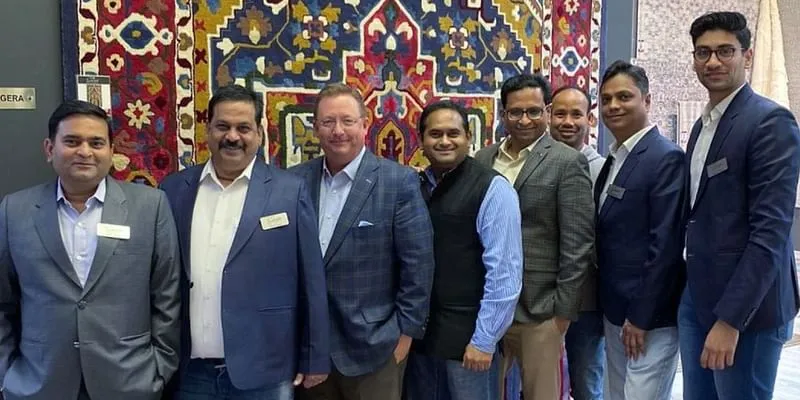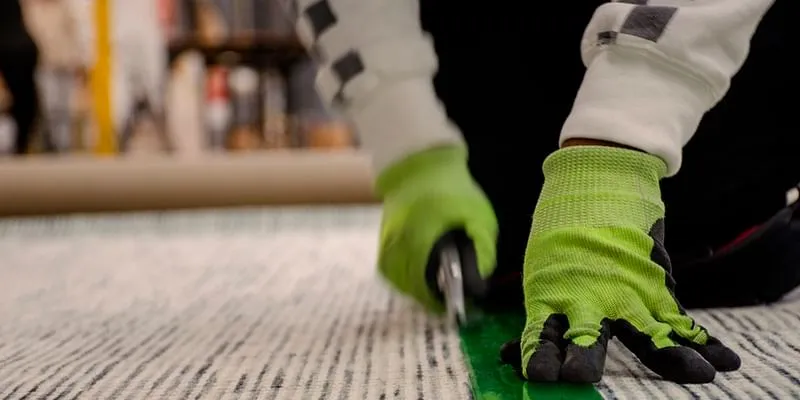How this Jaipur-based carpet manufacturer is making rugs for the world and clocking Rs 250 Cr turnover
Radhe Rathi set up Kaleen India in 1996 after exiting his family business of textiles. Over the last few years, the rug manufacturing and selling business has made carpets for luxury hotel chains like Marriott International, Hilton and The Hyatt, and has clients spanning across 50 countries.
Until 1994, Radhe Rathi was involved in his family’s textile business, handling its exports arm. But due to some family differences, he decided to move out.
Radhe, who had been living and working in the US, and exploring avenues outside the textiles industry, saw an opportunity in the rugs market when a trading project accidentally fell into his hands. His experience in textiles enabled him to explore the opportunity further. Moreover, carpets seemed like a good break. Radhe tells SMBStory.
“The garment industry is extremely unstable because of the shelf life of a garment. Carpets, however, are more sustainable as they last longer.”
He dived into the industry and started exploring new avenues. In 1996, he established , a rug manufacturing and selling business. He shares that in the initial years, he would load carpets onto his van and sell them around the US. Although he started out with trading rugs in the overseas markets, the company gradually moved into manufacturing.
In 2000, Radhe’s younger brother, Monty Rathi (COO of Kaleen Group), joined the business and the duo shifted base from the US to Mumbai, and set up manufacturing units in Panipat, Mirzapur, and Bikaner.
Today, Radhe divides his time between the US and India. The Kaleen Group has four subsidiaries under it, three Indian and one in the US, including Kaleen Lifestyle Ltd., Kaleen Loomwork, Marudhar Fashions (textile manufacturing arm for floor covering and space decor) and Kaleen US which is a distribution arm headquartered in Dalton, Georgia.
In FY20, the group clocked a turnover of Rs 250 crore.

Radhe Rathi (extreme left) with Kaleen India team
Building products for the world
Radhe, who was born and raised in Mumbai, says he has experience in “all markets.” He elaborates that the experience he garnered while running the export vertical of his family textile business proved to be immensely valuable as it gave him an insight into the operations of the international market.
Citing the difference between the Indian and the international market, he says, “The international market is technologically advanced whereas India dominates the world market in the hand-made carpets.”
Moreover, Radhe emphasises that Kaleen India’s USP lies in how it leverages technology in a largely traditional business segment. The company specialises in making machine-made and handmade carpets using techniques like hand-knotting, hand-tufting using broadlooms, pit looms, and power looms.
In simple terms, power looms are mechanised versions of traditional handlooms. Speaking about rugs made using broadlooms, Radhe says, “From handlooms, we ventured into crafting broadloom, a four to five-meter wide rug whose length ranges from 25 to 50 meters, and is the result of a team effort led by a master weaver and three to four skilled weavers. Overall, the complete rug-making process enagages around 25 artisans.”
The business primarily functions through the B2B channel. Explaining the business model, he says, “We are more like a stock-and-sale business. Based on our understanding of the market, we prepare our own collections, build inventories in the US and sell through catalogues and samples all over the US.”
Kaleen has a network of clients spanning over 50 countries including the UK, US, Canada, and Brazil. It also claims to ship more than 95 percent of its orders within 48 hours.
The business has collaborated with celebrities like Hilary Farr, Paula Deen, and Rachel Ray to promote its products. It has also made carpets for luxury hotel chains like Marriott International, Hilton and the Hyatt through its distribution partners in the US.
Recently, it also introduced a DIY online carpet programme called Colour Bistro on its website wherein the customer can experiment with the shape, size and colour of the carpet through various options and palettes.
Weaving the strings right
Radhe says that the company is focussed on three key areas – innovation, product, and services. In order to excel in services, he stresses on hiring the right people and forming a skilled team.
He says, “Servicing is not just about the product; it includes everything from how you respond to the customer to how you resolve customer queries, among other things. Customer satisfaction is the most important thing.”
He says that listening to customers at all times is one of his priorities. However, he adds that even within the realm of client servicing, the after-sales services has some limitations.
“The beauty of handmade carpets is that they can be altered even after they are made. In machine-made carpets, minor alterations can only be made before installation. After installing, making changes is difficult,” he explains.
Kaleen India is also building a manufacturing plant located around Panipat and Karnal in Haryana, which will manufacture around 375,000 carpets (with an average of size of five-by-eight) yearly.

Kaleen India has manufacturing facilities in Panipat, Bikaner and Mirzapur
The industry and growth plans
The carpet industry evolved a lot in recent years, says Radhe. “I see more opportunities than challenges in the sector. Also, the carpet industry is growing at a very fast pace,” he adds.
He says that the industry has picked up pace primarily due to the infusion of technology. He also adds that people involved in the segment are proactive and innovative, which further gives an impetus to the industry at large.
He is also quick to add that capital investments remain a major challenge in the industry. “Land is so expensive that it makes it impossible for a person to think about building a world-class facility.”
According to a report by Mordor Intelligence, almost 90 percent of the carpets made in India are exported. The exports stood at Rs 64,407.19 crore ($916.15 million) between April-November 2019. In India, Saif Carpets, YAK Carpets, and Obeetee Rugs are some of the well-known companies in the segment.
Radhe reasons that the domestic consumption of Indian made carpets is quite low (around 10 percent), and attributes the low consumption demand patterns to the environmental and climatic conditions. He says, “India does not have the climate where hand-made carpets can sustain. For example, wool tends to collect dust. That is why Indians go for mechanised carpets made in Turkey or Belgium.”
Going forward, the business plans to invest more in technology and software for human resource. The company also recently shifted its base from Mumbai to Jaipur during the pandemic, further highlighting the trend of companies moving beyond metropolises, strengthening the local economies.
Edited by Kanishk Singh









